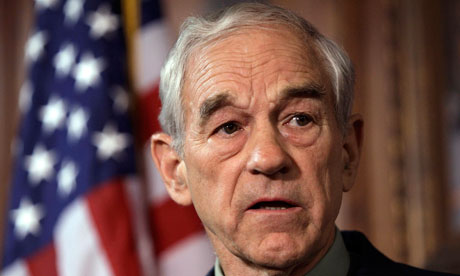For the last few days, the American media and political classes have been debating the fallout from the Ames straw poll: the Iowa ritual that marks the first real hurdle in the Republican nomination race. There was much to say. Michele Bachmann won, cementing her as the Iowa frontrunner. Tim Pawlenty came third and instantly pulled out. Herman Cain's fifth place burst his bubble. Rick Santorum's fourth place gave him a lift. Even some who were not taking part such as Sarah Palin were endlessly analysed.
But what of Ron Paul, who came second? The Texan congressman, outspoken libertarian and Tea Party idol got a mere 152 votes fewer than Bachmann. Where was the analysis of his campaign chances or better still a debate over his policy positions.
As usual,
Paul was mostly ignored. The Washington Times declared him a "loser" even as it said Santorum, with 3,014 fewer votes than Paul, was a "winner". The blanking given to Paul
was best summed up by Jon Stewart of the Daily Show, who showed news anchors and analysts laughing at Paul and treating him like a geek in high school being teased by jocks.
If Paul had got an extra 153 votes and actually won, I bet the analysis would have stayed the same. Paul would have been dismissed as a "no hoper" and Bachmann's second place would still have been hailed as the real breakthrough.
http://www.politico.com/news/stories/0811/61412.html best in a rare piece outlining its unfairness. But even it could not resist a dig at Paul's opinions. "I do not fully understand Ron Paul and his beliefs," wrote columnist Roger Simon, but then he added: "But I do understand when a guy gets shafted and Ron Paul just got shafted."
All of which, begs the question: why? Despite Simon's protestations, Paul's beliefs are easy to understand. He is a libertarian who believes in small government at all costs. That extends to social policy, as well as foreign policy. So Paul wants to scrap the department of education and end the war on drugs, at the same time as condemning the invasion of Iraq and warning against threatening Iran.
Unlike other candidates from both parties who tack left and right as the polls tell them Paul has held his beliefs for years and does not change them to suit a focus group. He has principles and stands by them. This makes Paul admirable even when you disagree with him (as I mostly do). It also makes Paul the one thing that American media and political elites of all stripes can't stand: a genuine outsider.
This is especially true for foreign policy. Paul's outspokenness on America's wars abroad and troubles with Iran are a prime example.
During the last GOP debate, Paul spoke angrily in favour of leaving Iran alone and played down the threat of Tehran's nuclear ambitions. He also made reference to the US-backed coup in Iran that overthrew democratically-elected Prime Minister Mohammad Mosaddeq in 1953. "We started it in 1953 when we sent in a coup, installed the Shah
it's been going on and on because we just plain don't mind our own business. That's our problem!" Paul said, showing he knew his Middle East history.
But, of course, no politicians or journalists are interested in that history. That like Paul's opposition to the war s in Iraq and Afghanistan is seen as unpatriotic and that is a cardinal sin. Whether Republican or Democrat, mentioning the idea that other nations around the world might have good cause to be annoyed at the US is a no-go area. Mentioning events like the 1953 coup in Iran backed by the CIA and Britain triggers a collective cultural response of putting hands over one's ears and shouting: "La, la, la, la!"
It goes against the idea of American "exceptionalism". Paul's positions question the country's very role in the world. He even calls America an "empire". That is simply too much for the system to take. Far better to debate familiar topics like gay marriage, abortion rights, taxes and welfare cuts. Or ridiculous side issues like flag-burning.
Meanwhile, Paul is portrayed as the crazy uncle at the family party. Which is a tragedy. Paul likely won't win the 2012 nomination. His support is solid, enthusiastic, but hard to see growing very broad. But to cast him as a fringe weirdo says far more about the biases and idiocy of the media and his political rivals than it does about Paul.
http://www.guardian.co.uk/commentisfree/cifamerica/2011/aug/16/ron-paul-media-bias?CMP=twt_fd


